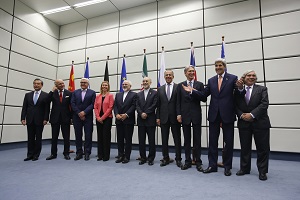July 2015 Current Events: World News

U.S. News | Business News | Disasters & Science News
Here are the key events in world news for the month of July 2015.
Cuba and U.S. Agree to Open Embassies (July 1): Cuba and the U.S. reach an agreement to open embassies in Washington D.C. and Havana. The U.S. Embassy in Havana is scheduled to open by the end of July. The reestablishment of embassies is another major step in rebuilding relations between the two countries. (July 20): Cuba's flag is raised outside its mission in Washington DC, officially re-opening it as an embassy and restoring full diplomatic relations between the two countries for the first time since 1961. In Havana, the U.S. mission is also restored to embassy status, but the American flag will not be raised until Secretary of State John Kerry visits next month.
U.S. Beats Japan in Women's World Cup (July 5): In the 2015 Women's World Cup Final in Vancouver, British Columbia, the U.S. rout Japan, 5-2. It is a rematch of the 2011 final, which Japan won with penalty kicks. Carli Lloyd scores the first hat trick in Women's World Cup final history, scoring three goals in the first fifteen minutes of the game. Lloyd is awarded the Golden Ball for being the World Cup's most outstanding player. It's a record third World Cup for the U.S. women, having previously won in 1991 and 1999.
Greece Holds Referendum (July 5): In a referendum, 61% of voters back Prime Minister Alexis Tsipras call to vote "no" on the proposed budget cuts by creditors in return for loans that Greece needs. After the referendum, European leaders say that negotiations with Greece will resume. However, the chance of Greece staying in the euro looks slim. (July 6): Banks remain closed for a sixth working day. Also, the government continues to limit money transfers and ATM cash withdrawals to control the drain on deposits.
Iran Agrees to Historic Nuclear Deal (July 14): Iran and the group of six nations, the United States, UK, France, China, Russia, and Germany, reach a historic agreement to limit Iran's ability to produce a nuclear weapon in exchange for the lifting of crippling economic sanctions. "Today's announcement marks one more chapter in our pursuit of a safer, more helpful and more hopeful world," says U.S. President Barack Obama. He also says the agreement is "not built on trust, it is built on verification." Obama now faces the difficult task of persuading the U.S. Congress to endorse the agreement. Congress has 60 days to vote on the deal. Obama vows to veto any legislation that blocks implementation of the agreement. "Today is the end to acts of tyranny against our nation and the start of cooperation with the world," says President Hassan Rouhani. Meanwhile, Israeli Prime Minister Benjamin Netanyahu calls the agreement a "historic mistake," and says, "Iran will get a jackpot, a cash bonanza of hundreds of billions of dollars, which will enable it to continue to pursue its aggression and terror in the region and in the world." Iran agrees to reduce its stockpile of enriched uranium by 98%, place two-thirds of their installed centrifuges under international supervision, give the International Atomic Energy Agency (IAEA) permanent access "where necessary when necessary," and accept a resumption of sanctions if Iran violates any of the terms.
Military Legislation Sparks Protests in Japan (July 16): Parliament's lower house approves legislation that will allow Japan's military to participate in foreign conflicts in a limited capacity for the first time since World War II. Members of the opposition refuse to vote, leaving the session in Parliament over the issue. Meanwhile, the new bill sparks the largest public protests since the Fukushima nuclear accident in 2011. Japan's Prime Minister Shinzo Abe and the United States support the bill. However, China does not, calling it a threat to peace in the region. Foreign Ministry Spokesperson for China, Hua Chunying, says in a statement, "We solemnly urge the Japanese side to draw hard lessons from history, stick to the path of peaceful development, respect the major security concerns of its Asian neighbors, and refrain from jeopardizing China's sovereignty and security interests or crippling regional peace and stability." The legislation now moves to Parliament's upper house where the bill will be considered there for sixty days before a vote.
Taliban Leader Death Announced (July 29): Afghanistan's intelligence agency announces that it believes that Mullah Muhammad Omar, the founder and reclusive leader of the Taliban, died in 2013 in Pakistan. Rumors of his death have been frequent, and he has not been seen for several years. The Taliban has not confirmed Omar's death.

Source: Elaine Thompson via AP
Carli Lloyd celebrates her third goal during the Women's World Cup final

Source: Carlos Barria, Pool Photo via AP
The leaders of Iran and the six nations that negotiated the nuclear deal







